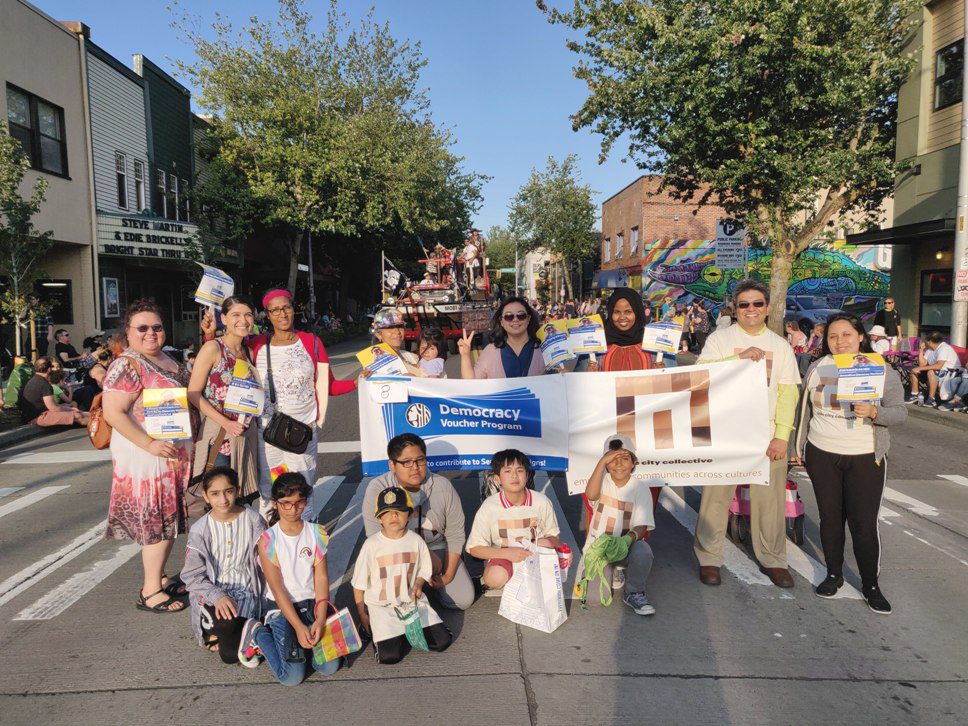
If you’ve ever wondered who supports the language line at the Seattle Office of Economic Development, we have Lake City Collective to thank. Lake City Collective, founded in 2019 by husband-and-wife Peggy Hernández and César García, is a grassroots nonprofit organization doing advocacy-in-action work on issues that primarily affect BIPOC communities in Seattle’s Lake City neighborhood and surrounding areas. Lake City Collective’s knowledgeable staff helps non-English speaking small business owners navigate complicated city bureaucracy with ease. In celebration of National Hispanic Heritage Month, we sat down with Lake City Collective’s César Garcia to learn more about the organization, advocacy work, and cultural heritage.

OED: How and why did Lake City Collective form?
César: In North Seattle, we saw that people of color, especially recent immigrants and refugees, were not connected to government the same way that other communities are in other parts of the city. When we first began to organize, we thought it would be easy to start as a Latino-based organization, because we are Latino. But even within our own neighborhood, there were Chinese families, Native American families, Vietnamese families, and more, whose children play together, who help maintain the landscaping, and who are all facing the same issues. Lake City Collective was formed to give all of us a voice, a place at the table to improve our living environments and connect with better opportunities. As recent immigrants, we believe in working to preserve our native traditions and language even in a new country, so we do a lot of community and cultural events as well.
OED: How did Lake City Collective become connected to the OED?
César: At the time, there was a North Seattle business district organization that was having difficulty reaching out to ethnic businesses in the area. Lake City Collective jumped in to do outreach in the district, learning all about the Office of Economic Development along the way. Before founding Lake City Collective, I worked as a Community Liaison for the Seattle Department of Neighborhoods, where I gained important knowledge about how the city government works—information which I now share with the staff at Lake City Collective.
OED: One of the main things Lake City Collective offers is language interpretation services. How does the language line work?
César: When somebody calls the OED main line and chooses an extension with a different language, they can leave a voicemail that we review and call back with bilingual staff later. The dedicated staff at Lake City Collective don’t just translate—over time they have learned a lot about navigating contracts, licensing, permitting, working with different municipalities, and more, and share this knowledge with callers seeking our help. Our interpretation services are offered in Spanish, Mandarin, Cantonese, Amharic, Somali, and Korean, and other unlisted languages. For example, our Thai specialist has been instrumental in reaching out to the Thai community in Seattle to share information about services that OED offers.
OED: What has been the highlight of your work? Any proud moments?
César: I think the most rewarding part of our work is when we get to meet in person with small businesses. It’s important to get to know the business owners to understand their background, history, barriers, and needs. We see businesses as families, and they often are family businesses. Our main goal is to help these businesses become independent, so it’s exciting when they learn how to navigate and connect with the city to utilize resources. We are often learning together, in community with one another, which makes this work worth it.
OED: What do you hope for Lake City Collective in the future?
César: Thanks to the Office of Planning and Community Development, we recently secured a half-block parcel of land that we would like to turn into a multicultural center. We hope to work with the community, including small businesses, to figure out what the center should look like to best serve various ethnic groups. We’re also hoping to grow our business support program—we have lots to contribute in terms of digital access and navigating bureaucracy with cultural understanding. It would be wonderful to have regularly scheduled full-time staff for all the languages we offer, since right now we only have part-time staff. More staffing, and a permanent home, is our vision for the future.
